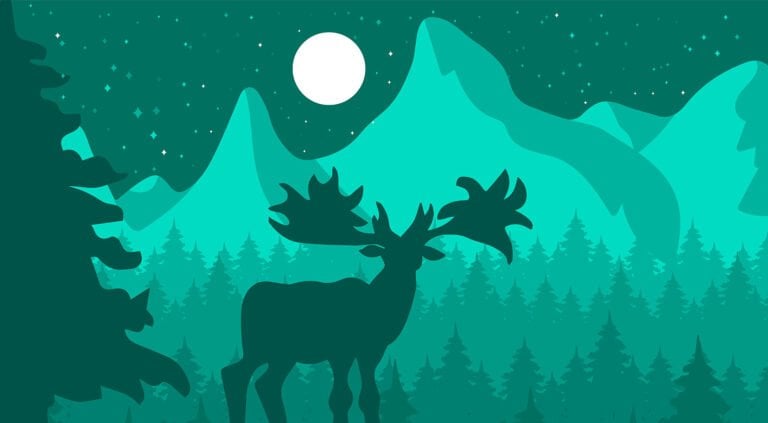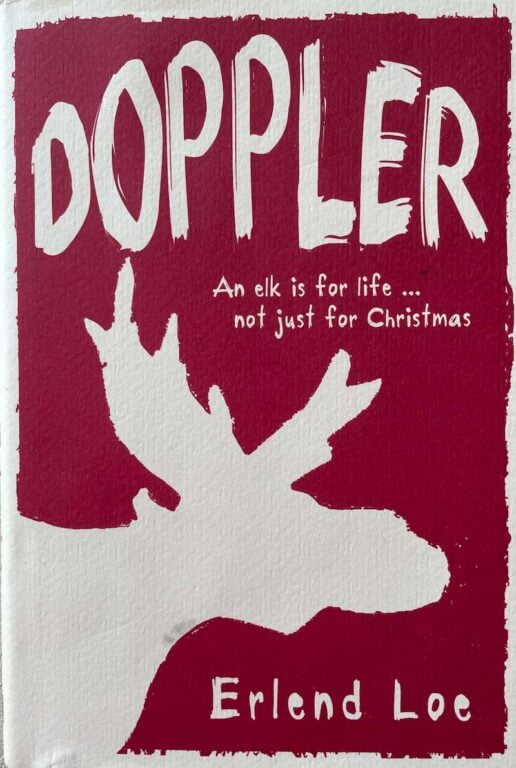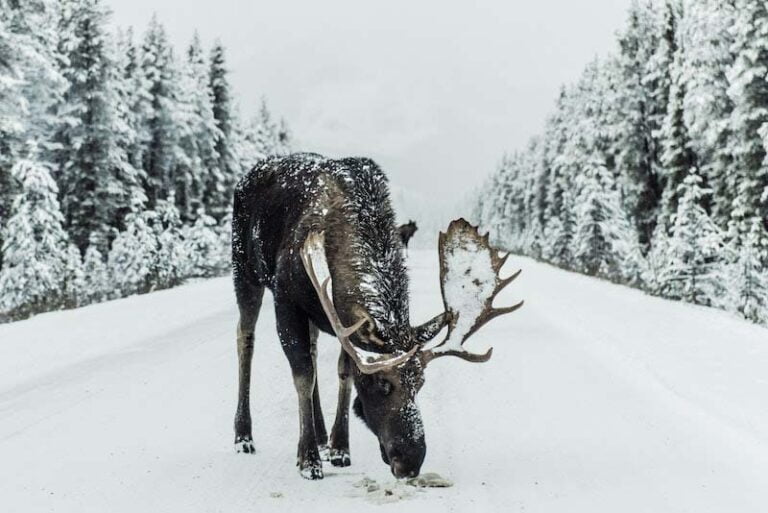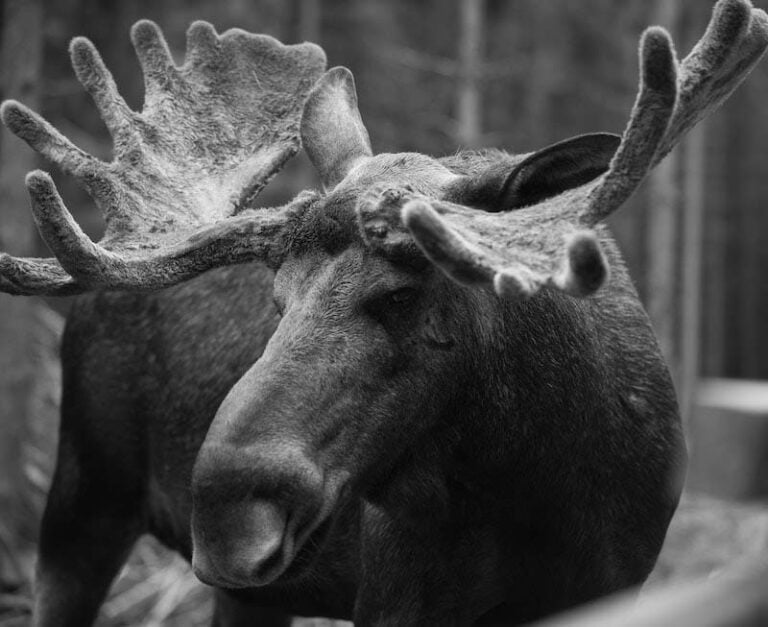A deeply subversive fable about consumerism, existence… and a baby elk called Bongo.
Spoiler Alert: This is going to be a reasonably deep dive into the book. There will be some fairly major spoilers. After a brief outline and my overall impressions, you may want to decide between reading the book and continuing with this article!

“I am a man of my time. A failed man of my time. Or just a man of a failed time.”
Story outline
Andreas Doppler is a nice man. He lives in a nice house with his nice wife and together they raise their children to become nice people. He has a nice job, and he enjoys nothing more than a nice bike ride through the forests around Oslo.
Order Doppler with free worldwide delivery on Book Depository. Also available from ARK (Norway) and Amazon.
On one such bike ride, shortly after his father dies, Doppler falls and hits his head. Lying on the forest floor he feels compelled to abandon his ‘nice’ life and live in a tent in the forest.
Doppler packs away some belongings and leaves his family a note telling them not to expect him for dinner, before hiking into the forest and setting up camp.
A few weeks later, after running out of food, he realises that if he’s going to live off the land he’ll have to kill animals. He sees a passing Elk (Moose, to North American readers) and kills her.

The elk was a mother with a calf and initially Doppler tries to get the calf to flee. Eventually Doppler adopts the Elk, not entirely through choice, and so begins a magical friendship.
Together they weave their way through a life of forest craft and anti-capitalist living.
Overall impressions
Perhaps the first thing to say about this book is that it’s not really a novel. It’s presented in chapters and it’s maybe too long to call it a novella.
But a novel generally has a character go through some degree of personal change over the course of the novel. Overall, it feels like one act in a longer work.
Does this matter? Probably not. But if you’re expecting a novel-like story with a satisfying conclusion then you may be disappointed.

One thing the book is, however, is very funny. Doppler is a very matter of fact person, and nothing fazes him. He takes everything in his stride and brushes things off with a wry sense of humour. Absurd situations are presented without comment on how ridiculous they are.
So, it’s a book for people with an enjoyment of the surreal. But it’s also written with a lot of heart and is quirky and whimsical. Overall I’d say it’s a book where you get out of it whatever you bring to it.
I famously hate rating things because I feel distilling knowledge down to a simple scale is both impossible and pointless. I can only tell you how *I* found the book but regardless, for me, this is book deserves 4 out of 5 stars.
I’ve read a few reviews online where people haven’t taken to the book at all. I can see why that would be as Doppler is certainly not an easy character to root for. But if you can get into the right frame of mind then the book will definitely take you on an enjoyable journey.
Doppler’s friends and family
So, that should be all you need to decide whether you want to read the book. If you do, go and do it now – I’ll be right here waiting for when you get back. Otherwise, let’s take a closer look at some of the characters that Doppler meets along the way.
Doppler’s wife becomes pregnant during the book, thanks to a conjugal visit she pays to her husband in the forest. She tells him he will be expected to be home by the time of the birth in May and Doppler agrees, despite having no intention of doing so!
Doppler’s daughter, Nora, is 16 and heavily into the Lord of the Rings books and films. Doppler feels she’s a lost cause due to her ‘niceness’ and will inevitably simply integrate into society. At one point she diagnoses Doppler’s problem in the way that teenagers often do:
“You don’t like people, she said. You’re not a people person. And that’s why I don’t like you.”
Gregus is Doppler’s son. He’s 4 years old and attends nursery school. Doppler feels like Gregus is a cause that can be saved from society.
Order Doppler with free worldwide delivery on Book Depository. Also available from ARK (Norway) and Amazon.
When Doppler’s wife decides she needs to head to Rome for a break, Gregus stays with Doppler at the tent. He enjoys adventuring with his father but starts to get withdrawal symptoms when he misses his TV cartoons.

Dusseldorf is a man who has spent some time recreating the scene of his father’s death during the war in excruciating detail. His plan, when he finishes, is to end his own life. He and Doppler become friends when Doppler breaks into his house on a mission to obtain supplies.
Bongo is perhaps the most important character in the book after Doppler himself. Bongo is the pet elk that Doppler adopts after he kills its mother. Bongo turns out to be not such a great talker but a great listener. Doppler spends a lot of his time talking to Bongo as a sort of therapist.
“I’ll call the calf Bongo after my father, I decide as I’m strolling back into the forest. Even though my father wasn’t called Bongo I’ll name the calf Bongo after him. Sometimes you’ve got to be open to associations of this kind”
The theme of mental health
For me, the broadest theme of the book is mental health. In Doppler, Erlend Loe is presenting a main character who appears to be mentally unwell. One of the main problems with mental health, however, is that it always relates to ‘normal’.
If you asked Doppler, he would tell you that he’s perfectly fine. Yet he’s in a mental state in which living outside of society is preferable to living within it. One of the great aspects of the book is that it’s never stated categorically that Doppler is suffering.
We know his father has just died and we know he falls off his bike and hits his head only to feel a sense of calm flood over him as the problems of the world disappear. But the reader gets to decide whether this is ‘the real Doppler’ brought to life or whether this is a manifestation of, for example, his grief.
It’s mentioned that Doppler had started to feel like an outsider in society. To me, then, it seems that his father’s death is the what spurs him to really reconsider his role in society and then falling off his bike shows him a solution.

Family
Doppler admits to never really knowing his father all that well. In the book, the older Dusseldorf becomes a sort of proxy for Doppler’s grief. Dusseldorf didn’t know his father either, and yet he knows exactly where, when, and how he died thanks to the military records.
Dusseldorf dedicates himself to recreating his father’s last moments as a scale model to try to find closure, at which point he intends to end his life. When it comes down to it, he realises that not ending his life is also a valid conclusion.
For Doppler, he works through his issues with his father by building a gigantic totem and whittling into it the figures of the three generations of Doppler men, joined by Bongo the Elk all sat atop each other on a huge egg.
Doppler is determined that his relationship with Gregus will be one where father and son understand each other – the relationship he never had with his father – and also that he must ‘save’ Gregus from becoming just another ‘nice’ member of ‘nice’ society.
Anti-consumerism
Another central theme is consumerism, and the way Doppler rails against it. Early in the book, Doppler discusses being almost overwhelmed by the sheer number of choices that have to be made simply to build a new bathroom.
And then, when the Iraq war breaks out, he sighs at the inconvenience of having to formulate an opinion on that as well and have the mundane aspects of his life reduced to mere trivia. The problem is that if you realise a task is meaningless then it might fall apart before you get to complete it.
“Not only did I not have my perspectives clarified, but I didn’t want them to be. For weeks it had irritated me that they couldn’t wait to start the bombing until we had finished doing up the bathroom”
The big irony in the book is that, even if you try to remove yourself from society, you still need…stuff! After preserving the elk meat by smoking it in a kiln, Doppler barters with a shopkeeper for milk, for example. But he also resorts to stealing – for example, Dusseldorf’s gigantic Toblerone bar – to get what he needs.
Society
Over time, people join Doppler in the forest. Gregus spends more time there, helping with his totem pole, also Dusseldorf, post non-suicide as well as a right-wing dog-walker that Doppler calls The Reactionary and a thief called Roger.

This is slightly useful to Doppler while he’s still crafting his totem pole. But once he’s done, the company gets to be annoying because, of course, he didn’t move into the forest to be surrounded by people!
Wherever there are humans, society exists whether you like it or not. Wherever you are, whether it’s a nice Oslo house or a tent in the forest, people will want to join you. Whatever you have, whether it’s a brand-new Volvo or a pet elk-therapist, people will want the same.
As Doppler puts it:
“One problem with people is that as soon as they fill a space it’s them you see and not the space. Large, desolate landscapes stop being large, desolate landscapes once they have people in them. They define what the eye sees. And the human eye is almost always directed at other humans. In this way an illusion is created that humans are more important than those things on earth that are not human”
So perhaps the over-arching conclusion is that society isn’t something that you can divorce yourself from. The book ends with Doppler beginning a journey from forest to forest. He is, ultimately, open-minded to the idea that maybe he doesn’t hate ALL people. Maybe it’s just…THESE people.
Order Doppler with free worldwide delivery on Book Depository. Also available from ARK (Norway) and Amazon.
Have you read Doppler by Erlend Loe? What did you think?

